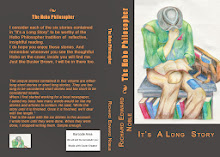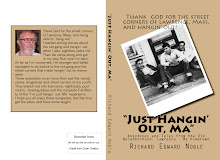
Hard Work?
What is it?
By Richard E. Noble
What is “hard work”? My experiences in “talking” about hard work are that it always ends up in a debate; and the usual result of the conversation is the diplomatic conclusion that “everybody who works, works hard”. I don’t agree. All work isn’t “hard work”. The world needs a definition of “hard work” as opposed to “work work” or “just another day at the office” work or “devising a theory of relativity” work or even “good work”.
Oprah Winphrey recently said that she thinks that she may be the hardest working black woman in America - I think that she said this in response to a supposed claim made by James Brown some time in the past, that he was the hardest working black man in America.
John D. Rockefeller was the richest man in the world; yet I’ve read that he carried a brown paper bag lunch to “work” with him everyday and sat at his desk to eat it. He claimed that he “worked hard”.
Many years ago I read where the government was trying to devise a comparable pay scale trying to equate the stenographers pool with the motor poor. I don’t think that they were successful.
I have always associated hard work with “the Old Man River” notion - you know, “tote that barge and lift that bale”. In my very brief experience in studying physics I learned that “work” as defined by physics involved moving something - lifting, carrying, humping, huffing, puffing, digging, bending, rowing, pulling, dragging, chopping, pounding, scrapping, picking, climbing ... these things mean “work” to me. Sweating is often a part of working hard. When we say something is easy, we say - no sweat. That’s right - if you are not sweating - it can’t be considered all that hard or “hard work”. But on the other hand just because you are sweating while doing something, it does not follow that you are necessarily performing some sort of “hard work” - for example having sex in a sauna or relaxing in a tanning salon.
In my life I have had jobs that I didn’t want to do; that I hated to do; that I didn’t want to get up and go to each morning but many of these jobs weren’t hard. Some of them were very, very easy - I just didn’t like doing them which made them very, very difficult…
On the other hand, I have had jobs that were extremely challenging and terribly physical - but I liked doing them. But even though I liked doing them, they were still hard. They were “hard work”. And anybody who tried to do one of these jobs would admit that it involved “hard work”. So what is hard work?
When I started out in the restaurant business; I was the dishwasher at a very busy restaurant. Being the dishwasher at this particular restaurant involved bending, scrubbing, pushing, moving, standing, humping - and at the end of a long evening dragging a huge garbage can through the kitchen, out the back door, down some steps, across a parking lot, then hefting it up to a height above my head and dumping it into a big dumpster. It was hard work.
Six months later, I was managing that restaurant. As a manager I often worked eighty to a hundred hours a week. It was a long, tiresome, fatiguing job. I considered it difficult and challenging but doing the dishes was harder work. There is no doubt in my mind. Eventually I got paid three or four times the dishwasher’s salary to be the manager; but as the dishwasher I worked harder. As the manager, I did a lot of thinking, planning and organizing - but that was not like humping, hefting, and scrubbing.
In my working career I have done farm work of all kinds. I picked oranges, apples, peaches, grapes, cherries; I’ve dug holes for construction companies; I’ve tonged oysters, drove a delivery truck, unloaded freight cars, picked cucumbers and humped sides of beef. On the other hand I’ve studied books at a University; I’ve managed businesses; I’ve worked as a reporter and journalist; I’ve published my own small newspaper; I’ve written and published my own books and I’ve owned and operated my own small retail businesses. All of these jobs were difficult and challenging - but they weren’t all “hard work”. They were all work. I did them all for a salary or a paycheck or a profit - or no profit. But they weren’t all equally hard or “hard work”.
I can still manage a restaurant; I can still write a book - but I can’t make a days pay tonging oysters or picking oranges or unloading freight cars. I might be able to wash the dishes in a not so busy restaurant - but I could never do what I did back forty years ago at that busy restaurant in downtown Fort Lauderdale, Florida - You know that place where all the rich people live. I remember working at that job for one hundred hours and taking home one hundred dollars.
I think what you get paid for doing something also reflects on its “hardness” or softness. Any job seems to be much harder if you feel that you are being underpaid; and conversely even a very difficult job seems like “no sweat” if you feel that you are being well compensated. Interesting to note - no one is ever “overpaid”. We are all often underpaid but no one is ever overpaid. We are compensated fairly, well compensated, sufficiently rewarded; even John D. Rockefeller, Andrew Carnegie, and today’s Oprah Winphry feel that they are “justly” compensated or rewarded but never have any of them ever been “overpaid”. I have never been “overpaid” myself - as I see it.
I have also had the experience of doing the same work but with different people or in different locations and in one instance the job is rather easy and in another quite difficult.
I have also found that wanting to do something and being forced to do something contribute to the rate of difficulty or “hardness”.
I have always liked the story of the runaway slave who was captured and brought before the judge. After questioning the slave the judge summed up what he had learned; “So you have admitted that your owner was a kind man; you have testified that he always treated you fairly; you have told us that you have never been beaten or abused; nor were you ever starved or not fed or clothed properly. What I can not understand is why you ran away.”
“Well, Your Honor, as I understand, the position is still available if you would like to apply,” the slave responded.
Another thing that makes a job difficult in my opinion is the fact that this job is all that you are capable of doing, it has no future, and you can’t do any better - either because you don’t have the education, you don’t have the legal status or you lack the ability either mental or physical. In other words this is as far as you can go in this life. You have hit your glass ceiling, your education ceiling, or your natural ability ceiling or your credit card ceiling. This circumstance can make almost any job “hard”.
So, hard work has to do with physical effort, sweat, amount of pay, freedom of choice, environment, co-workers, and hope for the future. So if you are working in this dirty, horrid, filthy location, lifting and humping your ass off for no money, for some abusive SOB, at a job with no future that you can’t afford to quit because you will starve to death if you don’t have the money, and nobody working around you cares or feels that you deserve any better position than what you have - you are working hard.
I don’t think that John D. Rockefeller, Andrew Carnegie or Oprah Winfrey qualify under any of the above criteria for “hard work” ... sorry.






































